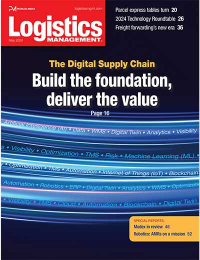In loss for truckers, judge lifts injunction in California AB5 ruling
The judge overseeing a major trucking industry challenge against enforcement of California’s new AB5 independent contractor law has lifted an injunction in the case after the U.S. Supreme Court failed to take up the matter.

The judge overseeing a major trucking industry challenge against enforcement of California’s new AB5 independent contractor law has lifted an injunction in the case after the U.S. Supreme Court failed to take up the matter.
Judge Roger Benitez of the U.S. District Court for the Southern District of California held an Aug. 20 hearing on the California Trucking Association’s (CTA) challenge to enforcement of AB5 against the trucking industry.
To say that California’s Assembly Bill 5 has created confusion in the trucking industry would be understating the issue.
As anticipated, Judge Benitez lifted the injunction, which had been reversed by the Ninth Circuit Court of Appeals. CTA is indicating that it intends to file a new motion for preliminary injunction under the Federal Aviation Administration Authorization Act (F4A) preemption standard set forth by the Ninth Circuit and on Dormant Commerce Clause grounds.
The Dormant Commerce Clause, or Negative Commerce Clause, in American constitutional law, is a legal doctrine that courts in this country have inferred from the Commerce Clause in Article I of the Constitution. The primary focus of the doctrine is barring state protectionism.
According to CTA, motor carriers will have to buy a “fleet of trucks” and maintain and repair those trucks, provide for meal and rest breaks, train employees, set up staff and provide worker's compensation insurance. As a result, CTA alleges, its members would pass these increased costs off to customers as increased prices.
Moreover, CTA argued that its members would have to “reconfigure and consolidate routes” to offset increased costs. Its members might eliminate certain routes all together and might have to reconfigure routes to ensure their drivers can take meal and rest breaks. All of this would make the routes of CTA's members less efficient.
And finally, CTA had contended that the increased labor costs caused by AB 5 would likely put small motor carriers out of business and force other motor carriers to leave California. The remaining motor carriers would therefore offer “diminished services.”
“We have routinely rejected similar arguments that the F4A preempts California labor laws that impose such indirect effects,” the appellate court ruled last April.
The judge’s earlier ruling denying the Dormant Commerce Clause challenge, for which CTA sought reconsideration, was vacated. Briefing on the new motion for an injunction will take place this fall.
In addition, the court will consider the Owner Operator Independent Drivers Association's (OOIDA) motion to intervene in the case.
The CTA and OOIDA are in negotiations over their legal rights to try and protect the independent contractor model. Some options being discussed:
- Business as usual and wait and see what law enforcement does;
- Carriers cancel leases and report drivers as employees;
- Two-check model—One check for the use of the truck and another check for the driver. Driver must declare truck income separately;
- A carrier may become a broker and use owner-operators with their own operating authority; and
- A “Business to Business” model (B2B), which lawyers deem unlikely as there is another test that must be met to claim it legally.
AB 5 places into law an independent contractor test known as the “ABC” test. In order to be considered an independent contractor, a worker must satisfy all three parts of the test.
A. The person is free from the control and direction of the hiring entity, both in contract and in fact.
B. The person performs work that is outside the usual course of the hiring entity’s business. (This is the issue for owner-operators in trucking.)
C. The person is customarily engaged in an independently established trade, occupation, or business of the same nature as the work performed.
Certain independent contractors—insurance agents, physicians, attorneys, accountants, engineers and direct sellers—were placed under a different test. With few exceptions, the relationship between independent truckers and their carriers, brokers and shippers will be governed by the “ABC” test.
AB5’s long-term impact on owner-operators is unclear. But already, some large truckload carriers are adjusting their relationships with owner-operators, with a few advising them to move out of state in order to continue to haul.
Carriers, brokers and even shippers will have to demonstrate that their business arrangements satisfy all three parts of the “ABC” test, some legal experts said.
The Supreme Court’s refusal to review a legal challenge has trucking company-related workers and carriers scrambling for a suitable Plan B.
The CTA called the Supreme Court’s decision not to review its 2018 lawsuit as “gasoline poured on the fire that is our ongoing supply chain crisis.”
California is home to an estimated 70,000 independent truckers. But the new AB5 rule is threatening to make it prohibitively expensive to remain independent, trucking officials said. Already, there have been protests at the Port of Oakland.
The AB5 rule appears to be making things worse. The CTA said the law “would cause motor carriers and owner-operators to bear the substantial, if not insurmountable, costs and burdens associated with shifting to an employer-employee business model.”

Article Topics
3PL News & Resources
April Services PMI contracts after 15 months of growth, reports ISM 2023 industrial big-box leasing activity heads down but remains on a steady path, notes CBRE report Q1 U.S. Bank Freight Payment Index sees shipment and spending declines Ryder opens up El Paso-based multi-client facility logistics facility April manufacturing output takes a step back after growing in March TIA rolls out updated version of framework focused on fighting freight fraud National diesel average is down for the third consecutive week, reports EIA More 3PLLatest in Logistics
April Services PMI contracts after 15 months of growth, reports ISM 2023 industrial big-box leasing activity heads down but remains on a steady path, notes CBRE report U.S. rail carload and intermodal volumes are mixed in April, reports AAR Q1 U.S. Bank Freight Payment Index sees shipment and spending declines S&P Global Market Intelligence’s Rogers assesses 2024 import landscape Pitt Ohio exec warns Congress to go slow on truck electrification mandates Q1 intermodal volumes are up for second straight quarter, reports IANA More LogisticsSubscribe to Logistics Management Magazine

Find out what the world's most innovative companies are doing to improve productivity in their plants and distribution centers.
Start your FREE subscription today.
May 2024 Logistics Management

Latest Resources














